- Home
- Celina Grace
Requiem Page 3
Requiem Read online
Page 3
She looked directly at the headmaster. “Mr Duncan, are you able to do that?”
Mr Duncan got up from the sofa, moving like a man twenty years older than himself.
“Me? I don’t know if I could bear it.” He looked at his wife, helplessly. “No, I must, I can see that I must.”
“Is there someone who could stay with your wife to give her some support? DS Olbeck will stay here as well, but perhaps a friend…”
“I don’t know, I—”
“I don’t want anyone,” said Mrs Duncan, in a voice ragged with tears.
Kate nodded slightly at Olbeck. She stood back slightly to let Mr Duncan make his slow and shaky way past her to the hallway.
At the mortuary, he stood in silence, with Kate beside him, regarding Elodie’s body. His gaze lingered on her pale face. The dead never look as though they are sleeping, not when looked at properly. Something—call it the soul, the spark of life—something indefinable has gone. The dead look truly dead.
Kate thought of her first glimpse of Elodie; the girl’s impish grin and vivid personality shined out from the stage. And now this, a whole person reduced to a hollow shell, lying on a cold metal table. She felt tears come to her eyes.
As if he could sense her pain, Mr Duncan began to speak, falteringly, almost as if he were talking to himself.
“She was always special. She had a glow about her, something special—everyone around her could feel it. She was eight years old when I met her, and I could see it then. Oh yes,” he interjected as Kate made some kind of noise in response, “I’m her stepfather. But that never mattered. She always felt like mine, just as if she were my real daughter. Yes, mine…”
His voice faded away. Kate sensed a huge tidal wave of emotion, held back by the flimsiest of barriers.
“Always special,” said Mr Duncan, his voice shaking. The dam broke. He put his hands up to his face, tears running down between his fingers. Kate put a hand on his trembling arm.
“It shouldn’t be like this!” he cried, and then his words were lost in a torrent of sobs. Kate, feeling her uselessness, kept a steadying hand on him, muttering the usual soothing words.
Later, after driving Mr Duncan home, Kate and Olbeck conferred briefly with the family liaison officer now stationed at the house. Mrs Duncan was sat at the kitchen table, staring out at the garden, a cup of tea untouched before her. Kate wondered whether to interview the parents now or whether to wait until the first shock had worn off a little. She decided on the latter.
“God,” said Olbeck as they got into the car. He leant his head against the back of the car seat and closed his eyes. “That was a bad one.”
“Especially on a hangover,” said Kate unsympathetically.
“You have no idea.” He sat up again, rubbing his temples. “Actually, I need a drink.”
“No, you don’t.”
“I do. A bloody big one.”
“I’ll buy you one.”
Olbeck looked at her in surprise. “You will?”
“A giant coffee,” said Kate, smiling a little. “Perhaps even a muffin to go with it.”
“Huh.” Olbeck slumped again. “We’d better get back, anyway.”
Later that afternoon, Kate, Olbeck and Anderton returned to Rawlwood Cottage. Normally, the three of them would use the time in the car to discuss the case, bring forward points they thought worthy of discussion, make suggestions about where to go next. Today, though, they sat in silence, all three of them busy with their own thoughts. Kate stared out of the window as they turned into the driveway, past the crumbling stone gateposts and through the banks of trees still clothed in their autumn leaves. She was thinking about the painting. When was she going to mention it? Was she going to mention it? Wasn’t it just a coincidence that the crime scene so closely resembled the picture? The body was found in the river, she told herself, trying to ignore that small voice inside that told her that it could still be important.
“Kate! Wake up. We’re here.”
Anderton’s voice made her jump. She gave herself a mental shake and got out of the car, smoothing back her hair and trying to get herself back into the right state of mind for this interview.
The Duncans were sitting in the living room. Mrs Duncan hunched into an arm chair; her husband perched on the edge of the sofa. The family liaison officer, a PC called Mandy, stood up as the other officers came into the room. Anderton introduced himself and his team.
“I’ll make us all some tea,” said Mandy. Kate smiled at her as she walked past to the kitchen. Briefly she wondered how many millions of cups of tea the liaison officers made in the course of their careers.
Anderton began with a few words of sympathy. Mrs Duncan kept her eyes on the arm of her chair, her fingers rubbing and picking at the fabric.
“I don’t know what we can tell you,” said Mr Duncan. “We don’t know any more than you do. Elodie went out last night—she was in a band and they were playing at a pub, The Black Horse. I don’t know what happened.”
“Did you expect Elodie to come home last night?”
“She was meant to.”
Anderton leant forward a little.
“Does that mean that you did expect her home, or not?”
The Duncans exchanged a glance. Then Mr Duncan said, reluctantly, “We did expect her home but…we weren’t sure whether she would be or not.”
Mrs Duncan gripped the edge of the seat arm, the bones of her fingers showing bluish-white through the skin of her hands.
“She’s been so odd recently…” she began falteringly, and then obviously realised the mistake in her use of the present tense. Tears began to stream down her cheeks, but she kept speaking. “She was so secretive, moody—we used to get so upset with one another, I don’t know…I didn’t know what to do.”
Anderton looked at Kate, and she responded to his unseen cue, taking up the baton.
“Were you worried when Elodie didn’t come home, Mrs Duncan? Had she done this before—stay out all night without letting you know when she’d be home?”
Mrs Duncan nodded.
“The past few months have been particularly bad. She was so argumentative. Nothing her father or I could do was right. Ever since her eighteenth birthday, she’s just run wild.” She stopped abruptly and put her face in her hands.
Kate turned to Mr Duncan, who was staring blankly at the carpet.
“Did Elodie have a boyfriend?”
“No.”
He said it harshly, almost angrily. Then he seemed to recollect himself. “I’m sorry. She did have a boyfriend for a few months, but that didn’t last long. There wasn’t anyone else.”
Kate glanced at Olbeck, who looked back at her expressively. How much did these parents actually know of their daughter? She wouldn’t have been the first teenager to hide an unsuitable boyfriend from their knowledge.
“We’ll need the name of Elodie’s ex-boyfriend, please, and also the names of her friends, the people she used to spend a lot of time with.”
Neither of the Duncans spoke for a moment. Then Mrs Duncan, fingers unconsciously pulling at the fabric of the chair on which she sat, said, “His name was Reuben, Reuben Farraday.”
“Is he a pupil at Rawlwood College?”
“He is not,” said Mr Duncan. “He and Elodie met at a concert. I’m afraid I have no knowledge of where he is now.” He and his wife exchanged another look. “I’m afraid I didn’t much approve of him.”
“Was that why they split up?”
“I don’t know.” His tone indicated that he would prefer not to continue talking about this particular subject, which normally would mean that Kate and the team would start to push harder. But these parents had just lost their daughter and, after a tiny shake of the head from Anderton, Kate switched subjects.
“You mentioned Elodie’s behaviour had changed over the past couple of months, Mrs Duncan. Did you know why that was?”
Mrs Duncan shook her head. “Every time I tried to talk to Elodie
about how badly she was behaving, she just got worse. Eventually, I just didn’t dare to bring it up anymore.”
“How was she behaving badly?”
Mrs Duncan wiped her face. “I thought I’d already said. She was rude, moody. Such hard work to be around. She didn’t want to do anything with me, with Tom, with anyone.”
“So she didn’t go out much?”
An incredulous look. “She went out all the time. She was never at home. But she would never say who she was going out with.”
“Did she ever bring any friends home?”
“Amy came over sometimes.” Mrs Duncan sniffed. “She’s known her for years. She’s a nice girl.”
“Amy is Elodie’s best friend? What’s her surname?”
“Peters.” Mrs Duncan hesitated, pulling again at the arm of the chair. “She hasn’t been round for a while. I think Elodie and she had an argument.”
“An argument? What about, Mrs Peters?”
Mrs Duncan shook her head.
“I don’t know. I don’t know anything.”
There was a moment’s silence. Kate thought back through the conversation, making a mental list of the words used by Elodie’s mother. Moody, difficult, secretive... She recalled the manic glitter she’d seen in Elodie’s eyes, and her heart sank a little. As if reading her thoughts, Mr Duncan asked in an almost inaudible voice, “How did she die?”
Mrs Duncan winced as if he had shouted. Anderton shook his head slowly.
“We don’t yet know, I’m afraid. The post-mortem will tell us more.”
Mr Duncan opened his mouth as if to ask another question and then shut it again. There was a lengthy moment of silence in the room. Kate caught sight of a photograph of a younger Elodie on the mantelpiece, framed in silver. She had an impish grin on her face and was staring out of the frame, pointed chin lifted. She looked as though she were laughing at them all.
Chapter Four
Kate had attended many post-mortems in the course of her career, but they had yet to become commonplace. She steadied herself with a deep breath. She always felt something like awe at the magnitude of death—how a whole, remarkable person could be reduced down to a waxen reproduction of themselves. The pathologist performing the autopsy was someone Kate hadn’t met before, a young man called Stanton. She had hoped it would be Doctor Telling, who she rather liked for being quiet and gentle and skilled at her job, but she was apparently on holiday for three weeks. Kate’s mind conjured up a rather bizarre mental picture of the gaunt, pale doctor sunning herself on a beach somewhere, still dressed in her pathologist’s scrubs. She dismissed the thought, as it was provoking an inappropriate grin, and brought herself back to the task in hand.
Anderton had cried off, citing a meeting, but Olbeck had met her at the coroner’s offices, turning up looking rather better than he had done yesterday. Presumably he’d not been out partying to the early hours the night before. Kate could understand his decision to stay in; she could think of few things worse than having to observe an autopsy with a raging hangover. She said as much to Olbeck.
“What would you know about it?” he said, rather grumpily. “You never get hangovers. You hardly bloody drink.”
“I can still imagine it.”
“Well, anyway. Let’s get on with it.”
Dr Stanton had a rather brusque manner, tersely commenting as he performed the various tasks that would untangle the mystery of Elodie’s death.
“Are there any indications of suicide?” asked Olbeck, who’d disappeared halfway through the operation to answer a text message, rather to Kate’s annoyance.
“Most definitely not,” said Stanton. He turned away from the table, leaning back against the instrument bench against the wall. “There’s no water in the lungs, which is always a good indication.”
“Ah.”
“And more pertinently than that, the hyoid bone is fractured.”
Kate knew the significance of that. “So she was strangled?”
Doctor Stanton looked at her appraisingly and then smiled rather flirtatiously.
“The indications are there. Bruises on the neck as well.”
“Right.”
“I don’t believe we’ve met before, have we? This will all be in my report, by the way. I’m happy to talk you through it—perhaps over coffee afterwards?”
Olbeck was grinning. Kate sighed inwardly. Flirting was one thing, but doing it over the body of a dead girl was distasteful in the extreme.
“That’s fine, thank you. I can read it later.”
Stanton shrugged. “There’s one thing you should know.”
“Which is?”
“She was pregnant.”
Kate felt the familiar little tremor inside her, as if a tiny foot had swung against her lower belly. When would she stop feeling that?
She cleared her throat. “How pregnant?”
“Not very. First trimester. About ten weeks, I’d estimate.”
Olbeck had stopped smiling. “That’s something her parents didn’t know.”
“Or they didn’t tell us.” Kate tried to run a hand through her hair, knowing it was pure displacement activity, before realising it was tied back tightly. “We’ll need to talk to them again anyway.” She remembered something else. “What about drugs? Any indications?”
Stanton had begun to peel off his gloves.
“You’ll have to wait for the tox tests. I should have the results within a week. There was plenty of alcohol and not much food in her stomach.”
So Elodie had been drinking despite her pregnancy. Had she even known she was pregnant? Who was the father? If Elodie had known she was pregnant, had she told anyone else? Looking down at the body, shrouded now in dull green cotton, Kate felt tired. So many questions… It was hard to know where to begin.
“Do you know the time of death?” asked Olbeck.
Stanton was rinsing his hands under the tap. He pulled a handful of blue paper towels from the dispenser on the wall, dried his hands and threw the crumpled up ball of paper into a wastebin next to him.
“It’s hard to say exactly, as well you know. But—like I say in my report—you can narrow it down to between about 3am and 5.30am the night before last. “
“He fancied you,” said Olbeck, when they were back in the car.
“No, he didn’t.”
“Yes, he did. It was obvious. You were definitely in there.”
Kate snorted. “Even if I was, I’m not going out with a pathologist, for God’s sake. Can you imagine going to bed with one, for a start? You’d always be wondering where their hands had been. Ugh.”
Olbeck chuckled. “Perfect partner for a necrophiliac.”
“Well, quite.” Kate flicked the indicator on to turn left. “As for me, it’s thanks but no thanks.”
“All right, all right. I get the message.” Olbeck checked his phone and made a satisfied noise.
Kate glanced over. “What’s up?”
“Nothing,” he said, smugly.
Kate sighed. “Don’t tell me. Your hot date for tonight.”
“Got it in one.”
“You have more hot dates than I have hot dinners,” grumbled Kate. “And what was with the texting during the PM? That’s not professional, Mark.”
“Oh, leave it out, Kate. It could have been work-related for all you know.”
“Well, was it?”
Olbeck was silent for a moment. “It might have been.”
“Was it?”
“No.” He grinned a little sheepishly. “But come on, it was only a minute. Besides, don’t tell me you’ve never done anything unprofessional at work.” He laughed a little. “Wait, what am I saying? This is DS Redman we’re talking about.”
Kate said nothing. She knew he was just teasing her, but his words had brought the painting sharply back to the forefront of her mind. Was she going to mention it? Should she? Of course you should, and you know it, a little voice whispered. Hard on the heels of that thought came the question, Does Jay
know yet? Am I going to have to tell him? Kate shivered inwardly, already dreading the moment.
Chapter Five
The crime scene photographs were already pinned up to the whiteboards when Kate entered the office the next day. The night before, she’d taken the picture down and put it away in an upstairs cupboard. Then she’d locked the cupboard door. She’d tried to call Jay, but the call had gone straight to his voicemail, so she’d hung up without leaving a message. Cowardly but… Kate’s train of thought was derailed as Anderton crashed through the door.
“Morning team, morning team.” He strode up to the whiteboards and pinned up another photograph beside the one of Elodie’s body. This new picture made a cruel contrast: it was a recently taken shot, professionally posed, obviously a school picture. Elodie in the dark blue and silver uniform of Rawlwood College, shoulders held back, pointed chin lifted, blonde crop neatly brushed. She looked younger, somehow, than she had when Kate had met her. Perhaps it was the uniform. Perhaps it was the expression on her face, eyes big and dark, a hint of anxiety in her gaze.
Anderton seemed to have recovered his mood and was back to his normal ebullient self. The rest of the team took up their usual positions, angled to keep their chief in sight as he paced up and down the room.
“Elodie Duncan,” said Anderton. “Our victim. Eighteen years old, a pupil at Rawlwood College, daughter of the College’s headmaster.”
“Stepdaughter,” said Olbeck.
“Yes, that’s right. Stepdaughter.” He stopped pacing for a moment, clutching his hair with one hand. “Her body was found at 7.06am two days ago by a jogger on the footpath that runs along the river by Arbuthon Green. Cause of death now confirmed as manual strangulation. Kate!” Kate jumped. “Wake up. Anything pertinent from the PM?”
Kate took a deep breath.
“She was pregnant. Early stages, about ten weeks.”
“Aha,” said Anderton. He turned and put a finger out, touching the school picture of Elodie almost tenderly. “That’s interesting. Do her parents know, I wonder?”

 Scimitar (A Kate Redman Mystery
Scimitar (A Kate Redman Mystery Fury: (A Kate Redman Mystery: Book 11) (The Kate Redman Mysteries)
Fury: (A Kate Redman Mystery: Book 11) (The Kate Redman Mysteries) Valentine
Valentine![[Kate Redman 08.5] Joy Read online](http://i1.bookreadfree.com/06/kate_redman_08_5_joy_preview.jpg) [Kate Redman 08.5] Joy
[Kate Redman 08.5] Joy Tasteful (A Kate Redman Mystery Novella)
Tasteful (A Kate Redman Mystery Novella)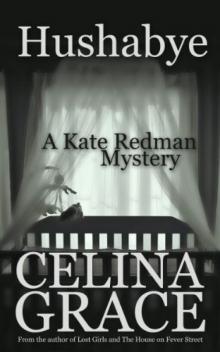 Hushabye
Hushabye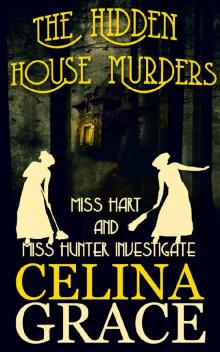 The Hidden House Murders: Miss Hart and Miss Hunter Investigate: Book 3
The Hidden House Murders: Miss Hart and Miss Hunter Investigate: Book 3 A Blessing From The Obeah Man
A Blessing From The Obeah Man Requiem
Requiem Creed (A Kate Redman Mystery
Creed (A Kate Redman Mystery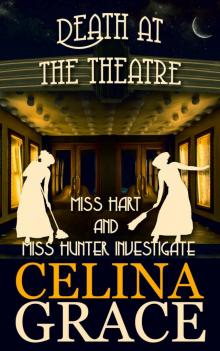 Death at the Theatre: Miss Hart and Miss Hunter Investigate: Book 2
Death at the Theatre: Miss Hart and Miss Hunter Investigate: Book 2 Siren (A Kate Redman Mystery
Siren (A Kate Redman Mystery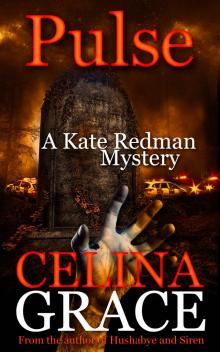 Pulse (A Kate Redman Mystery
Pulse (A Kate Redman Mystery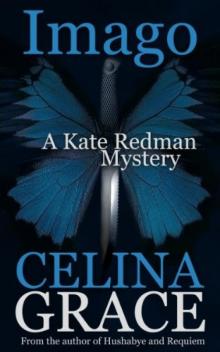 Imago
Imago The Asharton Manor Mysteries Boxed Set (Books 1 - 4)
The Asharton Manor Mysteries Boxed Set (Books 1 - 4) Descent (A Kate Redman Mystery Novella)
Descent (A Kate Redman Mystery Novella) Snarl
Snarl